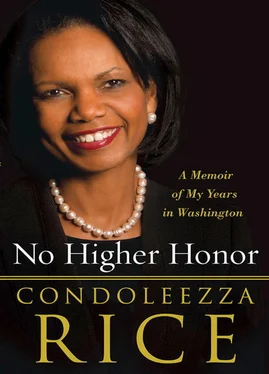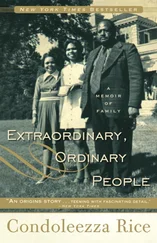I was shifting in my seat. “You got something to say, Condi?” the President asked.
I was a little startled but plowed ahead. “New York isn’t the entire U.S. economy,” I said. “Maybe you should hold the meeting somewhere that doesn’t feel like a crisis.” Then I whispered to the President, “If you do it in New York, every out-of-work trader will be interviewed by the networks worldwide.”
“No kidding!” the President replied. He suggested that I mention the point to the French leader before dinner. When we broke for cocktails, I talked to him, making the point about the potential news coverage. The President was able to convince Sarkozy and in the end the meeting was held in Washington, D.C.
The crisis was evolving in the context of the coming election too. The President was careful to brief both John McCain and Barack Obama. The problem was obviously going to outlast our time in office. The fact of the impending change of power gave every decision a slightly surreal feel. I was increasingly aware that I was making choices that would condition the environment for whoever came after me. That was really the context of the election for me. Certainly, as a citizen—and political junkie—I watched the contest with interest. But I was secretary of state, and I didn’t want to become too emotionally involved in what was going on. And I’d been there at the beginning with George W. Bush. I had little energy left for politics.
The day after the election, I was sitting in my usual morning staff meeting. “Are you going to say anything about the election?” Sean asked.
“What do you mean?” I asked. “To whom?”
“To the press,” he said. “They will want to know how you feel about the election of the first black President.”
“Proud,” I replied. And so I hijacked the first minutes of Sean’s morning briefing and told the press what I was feeling. I explained that as an American, and as an African American in particular, I was especially proud because of the long journey our country had traveled in overcoming wounds regarding race. “One of the great things about representing this country is it continues to surprise; it continues to renew itself; it continues to beat all odds and expectations,” I said extemporaneously. “You just know that Americans are not going to be satisfied until they really do form that perfect union.”
Preparing the Handover
THE DAYS WERE growing short for our administration as a new team prepared to take the reins. I wanted to ensure as orderly a transition as possible, something that is easier to do in the State Department than in the White House. When the presidency changes, even if there’s no change of party, the White House staff leaves en masse. But in the agencies, the career service carries on. This is tremendously beneficial to the country. For instance, Bill Burns continued as Secretary Clinton’s number three, able to bridge the two administrations.
I also wanted to make sure that my successor, Hillary Clinton, had all that she needed to get off to a good start as quickly as possible. We met several times, including at my apartment for dinner. Our relationship was—and is—an easy one, going back to the day she brought her prospective freshman daughter, Chelsea, to Stanford when I was provost. It helps too that there really is, even in difficult times, a kind of “fraternity” of secretaries of state. We all know what the job is like, its stresses and strains, and therefore there is great empathy among us. Perhaps now it would be better to call it a “sorority” since three of the four most recent secretaries—Madeleine Albright, me, and Hillary Clinton—have been women. Indeed, when Secretary Clinton finishes her term it will have been at least sixteen years since a white male held the office of secretary of state.
The transition was very smooth. But there is one source of awkwardness in the interim ten weeks between the election and the inauguration. Though there’s only one president at a time, it’s important to make certain that the incoming commander in chief is kept up to date on critical matters as they unfold.
There were a number of “hot” diplomatic issues, and the President and I decided that I would communicate with President-elect Obama directly. It wouldn’t have been appropriate to do so with Hillary because until a Cabinet officer is confirmed, the Senate frowns upon that person “acting in the role.” And so the President-elect and I spoke several times about the negotiations with North Korea, the Gaza problem, and—most urgently—the events that unfolded in South Asia in late November. We talked for the last time a few days before the inauguration. “Mr. President-elect,” I said, “this is probably our last conversation before you enter the Oval Office. I am proud of your election. Good luck and Godspeed.”

57
MUMBAI
ON NOVEMBER 26, I was preparing for the arrival of my family for the Thanksgiving holiday. I’d taken off a little early, but the phone was ringing as I arrived home. The operations center was on the telephone. David Mulford, our ambassador in India, and Anne Patterson in Pakistan were both calling. I flipped on the television as the watch officer described what had happened. There was carnage everywhere from ten coordinated attacks by Islamic terrorists across Mumbai, India’s most vibrant commercial city. Over the next three days, more than 150 people would be killed and almost twice as many wounded.
The President and Laura Bush had kindly invited my family and friends to Camp David for one last Thanksgiving dinner. Mariann and Dan Begovich, Gene Washington, and my Aunt Gee were all excited to attend. I didn’t want to disappoint them, and in any case it would be helpful to be with the President as we tried to manage the crisis.
Ambassador Mulford’s message was stark. “There is war fever here,” he said. “I don’t know if the prime minister can hold out. Everyone knows that the terrorists came from Pakistan.” I then talked to Anne. Her message was just as clear. “They have their heads in the sand,” she said.
Needless to say, I didn’t do much celebrating, showing up for meals and nothing else. We were issuing statements of support for India and trying, through Anne, to get the Pakistanis to say something useful. Then, on Saturday, I realized just how bad the communication between the parties really was.
I was leaving my cabin to join others for “chip-and-putt” golf on the lawn behind the President’s residence when the Camp David operator called and said that Judy Ansley at the NSC was on the phone. Judy was one of Steve’s deputies. “The Pakistanis say the Indians have warned them that they’ve decided to go to war,” she said anxiously.
“What?” I said. “That isn’t what they’re telling me.” In my many conversations with the Indians over the two days, they’d emphasized their desire to defuse the situation and their need for the Pakistanis to do something to show that they accepted responsibility for tracking down the terrorists.
I asked the operations center to get the Indian foreign minister on the phone, but they couldn’t reach him. Now I was starting to get nervous. Is he avoiding my call because they are preparing for war? I wondered. It still didn’t make sense, but it was India and Pakistan, and anything could happen.
I called back again. No response. By now the international phone lines were buzzing with the news. The Pakistanis were calling everyone—the Saudis, the Emiratis, the Chinese. Finally Mukherjee called back. I told him what I’d heard.
“What?” he said. “I’m in my constituency.” (The Indians were preparing for elections, and Mukherjee, who was a member of Parliament, was at home campaigning.) “Would I be outside New Delhi if we were about to launch a war?” he said. Apparently, he explained, the Pakistani foreign minister had taken his stern words in their recent phone call the wrong way. “I said they were leaving us no choice but to go to war,” he said. This is getting dangerous , I thought.
Читать дальше













